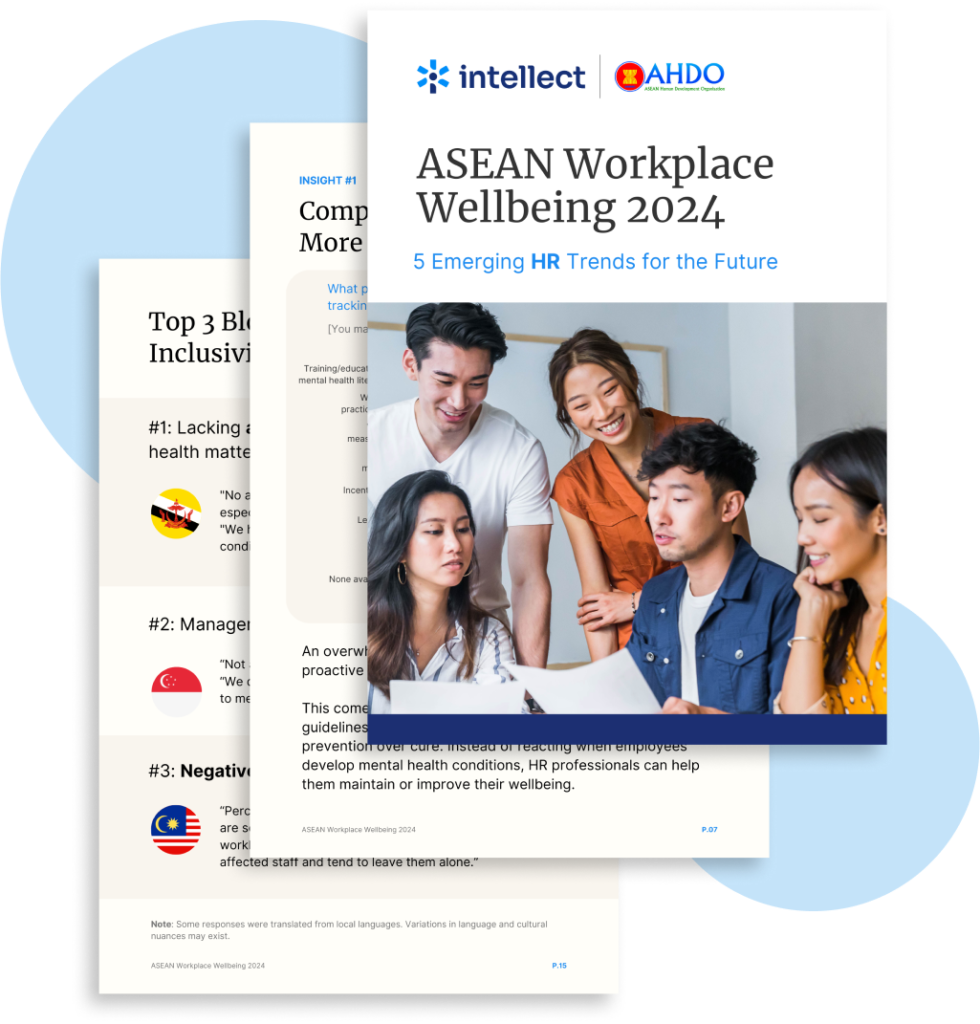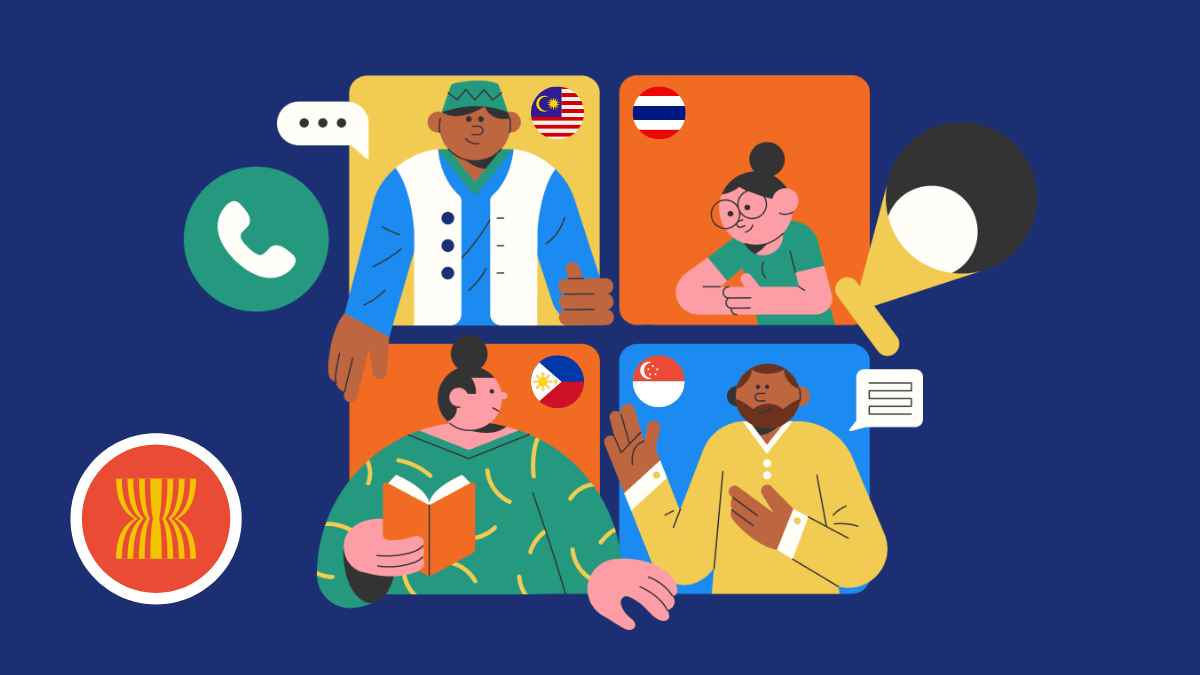Mental health stigma is still a stubborn shadow in Asian workplaces, much more so than in the US or Europe. But even within Asia, some countries are making strides in employee wellbeing, while others are still playing catch-up.
To evaluate this progress and assess how workplace wellbeing in Singapore compares to nine other ASEAN member states, Intellect and the ASEAN Human Development Organisation (AHDO) conducted a comprehensive survey of 585 HR professionals in 2024.
This is what we found:
1. Companies have started taking a more proactive approach.
2. Over 50% of companies train leaders in workplace wellbeing.
3. Vietnam and Thailand are most active in hiring people with mental health conditions.
4. The comprehensiveness of solutions is alarmingly low across the board.
5. Singapore sees the lowest engagement with wellbeing resources.
For country-specific insights, download the ASEAN Workplace Wellbeing 2024: 5 Emerging HR Trends for the Future white paper.

Delving deeper into our findings, we have identified three areas where workplace wellbeing in Singapore needs to play catch-up.
Gaps in Singapore’s workplace wellbeing
1. Despite a strong push from HR departments, employee engagement is the lowest in the region.
Singapore’s HR professionals are the third most active in promoting employee wellbeing, with 93.6% actively communicating mental health programmes (including EAP) to employees. Yet, employee engagement stands at a mere 18.3%, the lowest in the region. This stark contrast suggests that despite the availability of services, programs, and events, participation and utilisation remain dismal.
While these figures are based on self-reported data and may not capture the full picture, they indicate potential misalignment in HR strategies. Qualitative responses point to several barriers, including
- Stigma
- Confidentiality concerns
- Perceived relevance of the resources
Explore how Intellect’s partners have successfully overcome these barriers here.
2. Although the government promotes the employment of individuals with mental health conditions, Singapore lags behind in inclusive hiring practices.
Since Singapore launched the National Mental Health and Wellbeing Strategy in October 2023, its manpower ministry has been collaborating with tripartite partners and employer groups to encourage the hiring and support of individuals recovering from mental health conditions.
However, despite these efforts, Singapore ranked sixth in terms of inclusive hiring practices, with only 28.1% of surveyed HR professionals reporting actively employing individuals with mental health conditions.
- 1st: Vietnam 87.01%
- 2nd: Thailand 84.09%
- 3rd: Indonesia 46.88%
- 4th: Malaysia 44.07%
- 5th: Philippines 33.19%
- 6th: Singapore 28.13%
- 7th: Myanmar 26.32%
- 8th: Brunei 9.38%
Interestingly, Vietnam and Thailand reported nearly double the affirmative responses compared to Singaporean employers.
Find out what these employers are doing differently to champion inclusivity here.

3. Leadership training is a priority among companies in Singapore, but its success remains questionable.
That workplace wellbeing is shaped by an organisation’s leadership is a common consensus across ASEAN. According to our survey, Leadership Training (62%) ranked as the third most crucial priority and is most prevalent in Thailand (83%), Singapore (71%), and Malaysia (69%).
That being said, training has not always led to success. According to candid qualitative feedback from HR professionals in Singapore, this could be because
Workplace wellbeing is not truly prioritised.
- “Not all managers are onboard.”
- “The management lacks understanding about the importance of mental wellbeing and how it greatly affects productivity, staff turnover, staff health, etc.”
- “Organisations should avoid tokenistic approaches such as being involved only on World Mental Health Day but avoiding mental health conversations on other days of the year.”
Workplace wellbeing is prioritised, but training is ineffective.
- “Many a time, it’s better for the employee with mental health issues to resign as the company is not well-equipped to manage their emotional roller coaster. If we have in-house staff who are well-trained, we can help them.”
- “Lacking focus on aspects that are related to mental health, such as financial stability (e.g. reliable income, savings goals, loss and grief due to scams) and nutritional eating (e.g. eating disorders).”
Workplace wellbeing is prioritised and training is effective, but implementation is inconsistent.
- “In reality, it depends on individual line managers to treat the staff fairly. Managers are still expecting staff to stay late, be present in the office (not supportive of WFH), hold meetings at unreasonable hours like 8/9 am or 5/6pm or late night meetings (with overseas offices).”
- “We have limited data and insights on how well we are tackling mental health and wellbeing.”
Learn how employers can refine leadership training to bring about lasting change here.

Minding the gap
These discrepancies highlight a sobering reality: despite well-meaning intentions at individual, organisational, and national levels in Singapore, these intentions are not translating into tangible impacts. To effectively bridge these gaps, it’s essential to:
- Address barriers to engagement, such as stigma, confidentiality concerns, and the perceived relevance of available resources.
- Learn from best practices in inclusive hiring and support adopted by leading countries.
- Review and enhance approaches to leadership training to drive meaningful change.
For strategic recommendations, download the ASEAN Workplace Wellbeing 2024: 5 Emerging HR Trends for the Future white paper.








